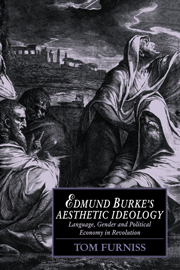Book contents
- Frontmatter
- Contents
- Acknowledgements
- Note on texts
- Introduction
- PART ONE AESTHETICS FOR A BOURGEOIS REVOLUTION
- 1 A theory not to be revoked: A Philosophical Enquiry
- 2 Labour and luxury: aesthetics and the division of labour
- 3 The political economy of taste: limiting the sublime
- 4 The labour and profit of language
- PART TWO REFLECTIONS ON A RADICAL REVOLUTION
- Notes
- Index
4 - The labour and profit of language
Published online by Cambridge University Press: 18 February 2010
- Frontmatter
- Contents
- Acknowledgements
- Note on texts
- Introduction
- PART ONE AESTHETICS FOR A BOURGEOIS REVOLUTION
- 1 A theory not to be revoked: A Philosophical Enquiry
- 2 Labour and luxury: aesthetics and the division of labour
- 3 The political economy of taste: limiting the sublime
- 4 The labour and profit of language
- PART TWO REFLECTIONS ON A RADICAL REVOLUTION
- Notes
- Index
Summary
We have seen that standard accounts of the sublime in the eighteenth century suggest that it undergoes a significant transition – culminating in Burke's Enquiry – from rhetorical technique to psychological response in face of natural phenomena. We have also seen, however, that what is presented in Burke as an immediate response to nature in the raw turns out to involve a strategy which may be described as rhetorical. Given this continued, if covert, relation between the sublime and rhetoric, and given the fact that so much of the Revolution Controversy turns around issues of language, the present chapter devotes specific attention to the last section of the Enquiry which concentrates on language as a source of aesthetic affect. This discussion will pave the way for a subsequent analysis of the rhetorical strategies in the Reflections and of Burke's ‘rage’ against radical rhetoric.
My argument about the Enquiry has been built upon a reading of the physiological, and therefore ideological, theory which governs the observations Burke makes about particular aesthetic instances and which he is so tenacious in defending against his critics. This theory argues that aesthetic affect is triggered by natural phenomena in one of two ways: either by generating psychological experiences (terror, love) which have corresponding effects on the body, or by inducing physical experiences (pain, pleasure) which affect the mind. Such processes are given authenticity through reference to Burke's observations about his own sensations and through the assumption that human responses are uniform. This empirical, experiential basis is central to the requirements of Burke's ideological project, but we have seen that it also needs to be framed by the supplementary notion of taste.
- Type
- Chapter
- Information
- Edmund Burke's Aesthetic IdeologyLanguage, Gender and Political Economy in Revolution, pp. 89 - 112Publisher: Cambridge University PressPrint publication year: 1993



